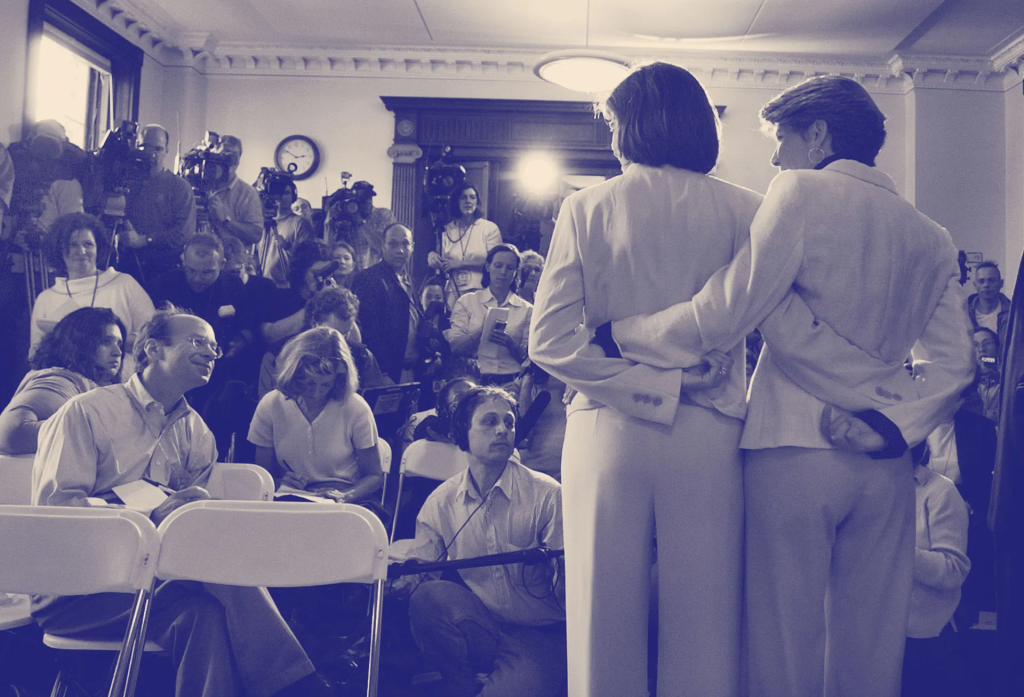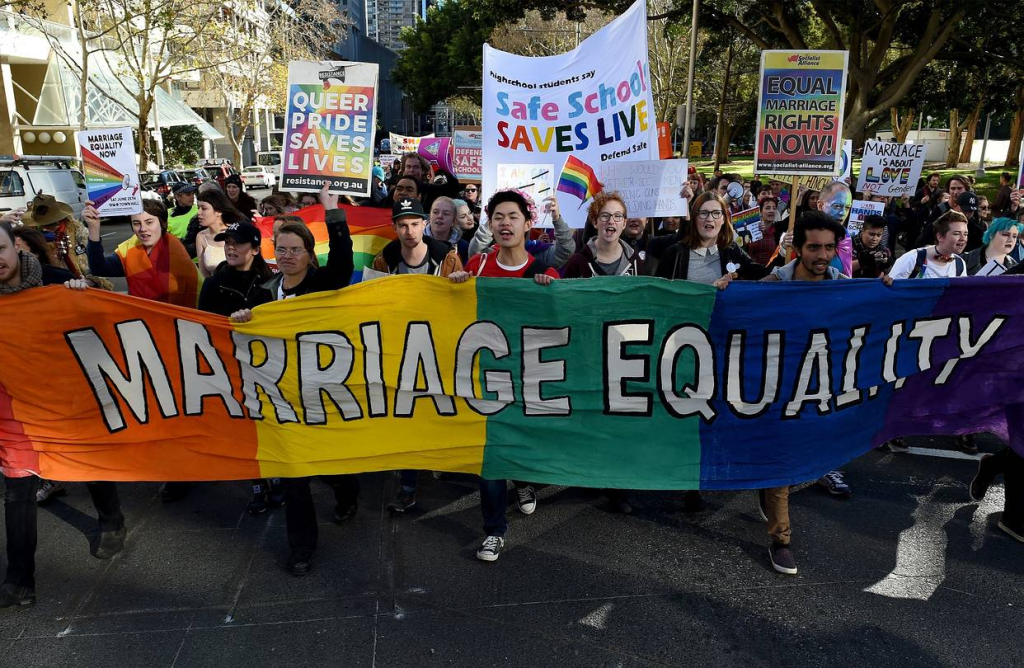In a significant move towards securing marriage equality in California, state lawmakers are spearheading efforts to enshrine these rights in the state constitution. With concerns mounting over the shifting landscape of national politics and recent setbacks in other areas of civil rights, advocates are rallying to safeguard the rights of same-sex couples.
Marriage equality has been a contentious issue in California for years, marked by legal battles and shifting public opinion. Despite being legalized in the state, there remains a lingering threat posed by outdated provisions in the constitution, a remnant of Proposition 8 passed by voters in 2008.
The upcoming November election holds the key to the future of marriage equality in California. Voters will have the opportunity to decide on Assembly Constitutional Amendment 5, a proposal aimed at removing the barriers to same-sex marriage once and for all.
Assemblyman Evan Low and Senator Scott Wiener, architects of the proposed amendment, emphasize the urgency of preempting potential challenges to marriage equality. With recent developments at the national level raising concerns, there is a palpable sense of determination to act swiftly and decisively.
Governor Gavin Newsom has thrown his support behind the amendment, highlighting the broader context of threats to civil rights across the country. The erosion of rights in other states serves as a stark reminder of the need to fortify protections for all Californians, regardless of sexual orientation.

For many couples in California, the fight for marriage equality is deeply personal. Christopher Huth, echoing the sentiments of countless others, underscores the significance of enshrining these rights in the state constitution. For him and his partner, it’s about equality not just in California but nationwide.
The struggle for equality is not confined to legal battles; it permeates the everyday lives of same-sex couples navigating a landscape fraught with challenges. Ron Bacon and Jon Cooper’s story reflects the resilience and determination of those who have fought for the right to marry and remain married.
As the November election approaches, Californians are gearing up to make their voices heard on this crucial issue. The outcome will not only shape the future of marriage equality in the state but also send a powerful message about the values of inclusivity and equality.
Beyond the legal implications, the proposed amendment represents a symbolic victory for the LGBTQ+ community and its allies. It is a reaffirmation of California’s commitment to progress and social justice, standing in stark contrast to regressive measures seen in other parts of the country.
The battle for marriage equality is far from over, but with each step forward, advocates draw closer to realizing a more just and inclusive society. Regardless of the outcome in November, the momentum behind this movement speaks to the enduring resilience of those who continue to fight for love and equality.
In a significant move towards securing marriage equality in California, state lawmakers are spearheading efforts to enshrine these rights in the state constitution. With concerns mounting over the shifting landscape of national politics and recent setbacks in other areas of civil rights, advocates are rallying to safeguard the rights of same-sex couples.
Marriage equality has been a contentious issue in California for years, marked by legal battles and shifting public opinion. Despite being legalized in the state, there remains a lingering threat posed by outdated provisions in the constitution, a remnant of Proposition 8 passed by voters in 2008.
The upcoming November election holds the key to the future of marriage equality in California. Voters will have the opportunity to decide on Assembly Constitutional Amendment 5, a proposal aimed at removing the barriers to same-sex marriage once and for all.
Assemblyman Evan Low and Senator Scott Wiener, architects of the proposed amendment, emphasize the urgency of preempting potential challenges to marriage equality. With recent developments at the national level raising concerns, there is a palpable sense of determination to act swiftly and decisively.
Governor Gavin Newsom has thrown his support behind the amendment, highlighting the broader context of threats to civil rights across the country. The erosion of rights in other states serves as a stark reminder of the need to fortify protections for all Californians, regardless of sexual orientation.
For many couples in California, the fight for marriage equality is deeply personal. Christopher Huth, echoing the sentiments of countless others, underscores the significance of enshrining these rights in the state constitution. For him and his partner, it’s about equality not just in California but nationwide.
The struggle for equality is not confined to legal battles; it permeates the everyday lives of same-sex couples navigating a landscape fraught with challenges. Ron Bacon and Jon Cooper’s story reflects the resilience and determination of those who have fought for the right to marry and remain married.
As the November election approaches, Californians are gearing up to make their voices heard on this crucial issue. The outcome will not only shape the future of marriage equality in the state but also send a powerful message about the values of inclusivity and equality.
Beyond the legal implications, the proposed amendment represents a symbolic victory for the LGBTQ+ community and its allies. It is a reaffirmation of California’s commitment to progress and social justice, standing in stark contrast to regressive measures seen in other parts of the country.
The battle for marriage equality is far from over, but with each step forward, advocates draw closer to realizing a more just and inclusive society. Regardless of the outcome in November, the momentum behind this movement speaks to the enduring resilience of those who continue to fight for love and equality.
In a significant move towards securing marriage equality in California, state lawmakers are spearheading efforts to enshrine these rights in the state constitution. With concerns mounting over the shifting landscape of national politics and recent setbacks in other areas of civil rights, advocates are rallying to safeguard the rights of same-sex couples.
Marriage equality has been a contentious issue in California for years, marked by legal battles and shifting public opinion. Despite being legalized in the state, there remains a lingering threat posed by outdated provisions in the constitution, a remnant of Proposition 8 passed by voters in 2008.
The upcoming November election holds the key to the future of marriage equality in California. Voters will have the opportunity to decide on Assembly Constitutional Amendment 5, a proposal aimed at removing the barriers to same-sex marriage once and for all.
Assemblyman Evan Low and Senator Scott Wiener, architects of the proposed amendment, emphasize the urgency of preempting potential challenges to marriage equality. With recent developments at the national level raising concerns, there is a palpable sense of determination to act swiftly and decisively.
Governor Gavin Newsom has thrown his support behind the amendment, highlighting the broader context of threats to civil rights across the country. The erosion of rights in other states serves as a stark reminder of the need to fortify protections for all Californians, regardless of sexual orientation.
For many couples in California, the fight for marriage equality is deeply personal. Christopher Huth, echoing the sentiments of countless others, underscores the significance of enshrining these rights in the state constitution. For him and his partner, it’s about equality not just in California but nationwide.
The struggle for equality is not confined to legal battles; it permeates the everyday lives of same-sex couples navigating a landscape fraught with challenges. Ron Bacon and Jon Cooper’s story reflects the resilience and determination of those who have fought for the right to marry and remain married.
As the November election approaches, Californians are gearing up to make their voices heard on this crucial issue. The outcome will not only shape the future of marriage equality in the state but also send a powerful message about the values of inclusivity and equality.
Beyond the legal implications, the proposed amendment represents a symbolic victory for the LGBTQ+ community and its allies. It is a reaffirmation of California’s commitment to progress and social justice, standing in stark contrast to regressive measures seen in other parts of the country.
The battle for marriage equality is far from over, but with each step forward, advocates draw closer to realizing a more just and inclusive society. Regardless of the outcome in November, the momentum behind this movement speaks to the enduring resilience of those who continue to fight for love and equality.
In a significant move towards securing marriage equality in California, state lawmakers are spearheading efforts to enshrine these rights in the state constitution. With concerns mounting over the shifting landscape of national politics and recent setbacks in other areas of civil rights, advocates are rallying to safeguard the rights of same-sex couples.
Marriage equality has been a contentious issue in California for years, marked by legal battles and shifting public opinion. Despite being legalized in the state, there remains a lingering threat posed by outdated provisions in the constitution, a remnant of Proposition 8 passed by voters in 2008.

The upcoming November election holds the key to the future of marriage equality in California. Voters will have the opportunity to decide on Assembly Constitutional Amendment 5, a proposal aimed at removing the barriers to same-sex marriage once and for all.
Assemblyman Evan Low and Senator Scott Wiener, architects of the proposed amendment, emphasize the urgency of preempting potential challenges to marriage equality. With recent developments at the national level raising concerns, there is a palpable sense of determination to act swiftly and decisively.
Governor Gavin Newsom has thrown his support behind the amendment, highlighting the broader context of threats to civil rights across the country. The erosion of rights in other states serves as a stark reminder of the need to fortify protections for all Californians, regardless of sexual orientation.
For many couples in California, the fight for marriage equality is deeply personal. Christopher Huth, echoing the sentiments of countless others, underscores the significance of enshrining these rights in the state constitution. For him and his partner, it’s about equality not just in California but nationwide.
The struggle for equality is not confined to legal battles; it permeates the everyday lives of same-sex couples navigating a landscape fraught with challenges. Ron Bacon and Jon Cooper’s story reflects the resilience and determination of those who have fought for the right to marry and remain married.
As the November election approaches, Californians are gearing up to make their voices heard on this crucial issue. The outcome will not only shape the future of marriage equality in the state but also send a powerful message about the values of inclusivity and equality.
Beyond the legal implications, the proposed amendment represents a symbolic victory for the LGBTQ+ community and its allies. It is a reaffirmation of California’s commitment to progress and social justice, standing in stark contrast to regressive measures seen in other parts of the country.
The battle for marriage equality is far from over, but with each step forward, advocates draw closer to realizing a more just and inclusive society. Regardless of the outcome in November, the momentum behind this movement speaks to the enduring resilience of those who continue to fight for love and equality.
Read more news:
